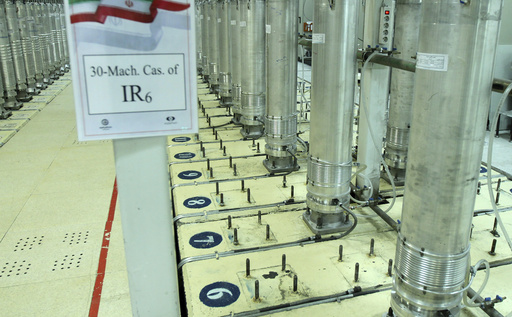DUBAI, United Arab Emirates — As tensions rise over Iran’s nuclear ambitions, the nation is set to start enriching uranium using thousands of advanced centrifuges at its primary nuclear sites, Fordo and Natanz, as indicated by the United Nations’ nuclear monitoring agency on Friday. This decision comes amid ongoing concerns regarding Iran’s enrichment levels, which are edging closer to weapons-grade purity.
The International Atomic Energy Agency (IAEA) reported that Iran plans to enrich uranium to 5% purity with new centrifuges. This is significantly below the 60% enrichment level that Iran currently achieves, suggesting that Iran may still be interested in engaging in negotiations with Western powers, particularly concerning the new administration of President-elect Donald Trump.
However, it remains uncertain what stance Trump will take towards Iran, especially as tensions grow; Iran has threatened military action against Israel amidst its ongoing conflict with Hamas in Gaza, following a ceasefire in Lebanon. The Trump administration had previously exited the nuclear agreement in 2018, igniting a wave of incidents across the Middle East.
Iran’s mission to the UN has yet to respond to inquiries regarding the IAEA’s recent findings. After the IAEA’s Board of Governors criticized Iran for its lack of cooperation during a meeting in November, Iran had previously warned of accelerating its nuclear program advancements.
In their statement, the IAEA clarified that Iran had reported plans to introduce uranium gas into multiple arrays of advanced centrifuges, specifically the IR-2M, IR-4, and IR-6 models. These centrifuges are designed to spin uranium gas, enabling a quicker enrichment process compared to the older IR-1 centrifuges, which have traditionally been the backbone of Iran’s nuclear program. Though the IAEA did not specify how many centrifuges would be integrated into each cascade, it is known that previous cascades have contained around 160 centrifuges.
It remains unclear if Iran has initiated the uranium feeding process into these centrifuges, as Tehran has provided limited clarity on its future plans. The decision to start enrichment at 5% offers Iran strategic leverage in negotiations while serving as a means to increase pressure if discussions do not align with its expectations. Enrichment at weapons-grade levels is approximated at 90%.
Following the breakdown of the 2015 nuclear agreement with world powers after the U.S. withdrew in 2018, Iran has pursued nuclear enrichment that hovers just below weapons-grade limits. Intelligence assessments reportedly indicate that Iran has not yet launched a dedicated weapons program.
As a participant in the Treaty on the Non-Proliferation of Nuclear Weapons, Iran is compelled to allow IAEA access to its nuclear sites to verify the peaceful nature of its program. Moreover, Tehran had consented to enhanced IAEA oversight under the 2015 agreement, which resulted in the lifting of certain sanctions in exchange for a significant reduction in its nuclear activities.
Yet, Iran has increasingly limited inspectors’ access to nuclear sites and has not fully addressed concerns regarding other locations where nuclear material was discovered following the agreement’s deterioration.
High-ranking Iranian officials, including Supreme Leader Ayatollah Ali Khamenei and President Masoud Pezeshkian, have previously expressed a readiness to engage with Western nations. However, amidst the ongoing conflict, Iran has also been accused of launching attacks against Israel.
Kazem Gharibabadi, an Iranian diplomat, criticized European nations for their perceived self-interest and irresponsible conduct during discussions with EU envoy Enrique Mora. Gharibabadi asserted that Europe had not been a serious participant in addressing Iran’s nuclear challenges due to a lack of confidence and accountability.
Mora described their conversations as “frank” and noted that discussions included topics such as Iran’s military support for Russia, the nuclear situation requiring a diplomatic solution, heightened regional tensions that must be de-escalated, and concerns regarding human rights.


